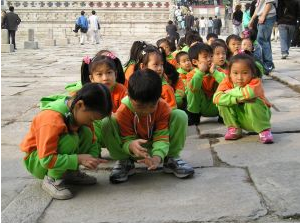 A recent survey revealed that the world’s unhappiest school children are found in South Korea. The country topped the list in the OECD’s PISA 2012 study, with fewer than 60% of children polled saying that they ‘agree’ or ‘strongly agree’ with the statement ‘I feel happy at school’.
A recent survey revealed that the world’s unhappiest school children are found in South Korea. The country topped the list in the OECD’s PISA 2012 study, with fewer than 60% of children polled saying that they ‘agree’ or ‘strongly agree’ with the statement ‘I feel happy at school’.
This is despite the fact that they are also heralded by the OECD as being among the highest achievers academically. Korea’s consistent academic success has arguably been responsible for fuelling its economic revolution over recent decades; but it would appear that this has been to the detriment of the country’s young people.
The intense pressure that is put on Korea’s school children to achieve academic success is considered a major contributing factor to the low levels of happiness they experience. When looking at parental expectation, Korea also tops the list; with nearly 90% of parents expecting their children to go on to gain a university education.
It is no surprise then that Korean high school students are unhappy. They have to undertake rigorous College Scholastic Ability Tests which determine the university that they will attend and thus their future prospects, all at a relatively young age.
The picture looks even more worrying for Korea when you consider they also have the highest suicide rate of all the countries looked at by the OECD, whereas all other countries are seeing the rate decline.
Elsewhere in the world, there are results that are to be expected and some that are more unexpected. The UK, for example, although not below the OECD average, fares surprisingly poorly in both academic achievement and children’s happiness. This is despite spending more than the average on education. The US, however, actually falls below the OECD average of 80% for happiness of school children.
On a cheerier note, Peru and Indonesia came in first and third place for children’s happiness; they were, however, among the lowest scoring for academic achievement.
In a Unicef report published earlier this year, the Netherlands topped the list for overall well being of children, taking into consideration 5 criteria; material well-being, health and safety, education, behaviour and risks, and housing and environment. Dutch children are also above average in the OECD report for school children’s happiness.
The Unicef report also implied that GDP does not markedly affect the levels of child well being in a country, which is evident from the happiness levels seen in the school children in countries like Peru and Indonesia.
Germany on the other hand featured in the top 10 in the Unicef report, but scored below average in the OECD when looking solely at children’s happiness.
It is clear that there is a balance to be struck between academic achievement and ambition and the happiness and well being of our young people.